The Parliament – President, Rajya Sabha & Lok Sabha
| Indian Parliament |
|
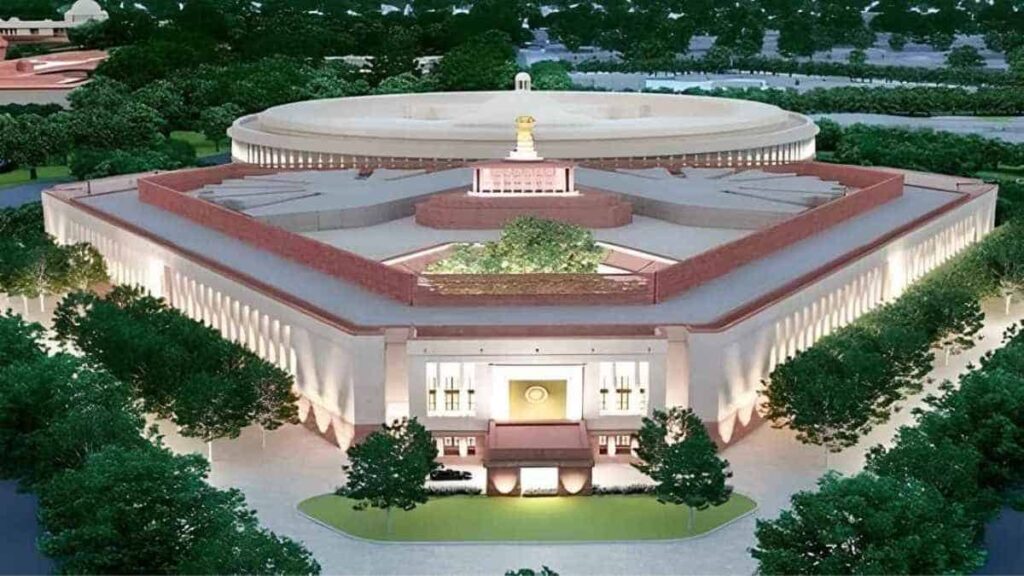
- Though President is not the member of either house of the parliament, he is an integral part of it.
- Principle function of Parliament is to legislate i.e. to make laws on all subjects enumerated in Union and Concurrent list (also on residuary subjects) & in some cases on state list subjects for the benefit of the country
- COM as a body is responsible to parliament for general affairs of the government.
- As a result, a vote of no confidence against any one minister is tantamount to vote of no confidence against whole COM
- Lack of parliamentary confidence in the government may be expressed by house of the people by –
- Passing motion of no confidence in COM
- Passing a censure motion
- Passing an adjournment motion
- Defeating the government on financial measures
Rajya Sabha
- VP is ex-officio chairman of Rajya Sabha
- Total membership is 245
- 233 members elected as representative of state & UTs
- 12 members nominated by president (Veterans from art, science, literature & social services)
- There is no difference b/w elected & nominated members except only elected members can participate in elections of President
- Office term for RS is 6 years with 1/3rd of members retiring every 2 years
- RS members are elected by legislative assembly of states & UTs by means of single transferable vote through proportional representation (Based on population)
- Only 4 members are elected from UTs
Also read: Vice President: Qualification, Election, Removals, Emoluments
- 3 from Delhi
- 1 from Pondicherry
- No seat is reserved for SCs & STs
- Retired members of RS are eligible for re-election & re-nomination
- RS meets in continuous sessions & is not subjected to dissolution
- Salary & other benefits are same as Lok sabha
- RS have equal footings in all the areas of legislation compared to Lok sabha except in area of supply, where Lok sabha has overriding powers
Recommended Books for UPSC Prelims and UPSC Mains
Qualifications
- Must be citizen of India & have attained 30 years of age
- Must be a registered voter in parliamentary constituency in any of the state
- Subscribe before election commission an oath, as prescribed by 3rd schedule
Working Hours |
|
Special Powers
- A resolution seeking removal of VP can be originated only in Rajya Sabha
- Under article 249, it can shift an item of state list to union or concurrent list
- If RS passes a resolution by majority of not less than 2/3 rd of members present & voting, then it is expedient for parliament to make laws wrt any matter enumerated in state list for whole or any part of territory of India on that matter for a period of not less than 1 year.
- However, RS can extend the law by passing same resolution with same majority for 1 year continuously
- If RS passes a resolution by 2/3rd of majority of members present & voting, then it is expedient in national interest to create one or more all India services
Limitations
Money Bill
- If Rajya Sabha returns the bill to Lok Sabha opposing the bill, then it is deemed to have passed.
- Rajya Sabha can send recommendations to Lok Sabha, but Lok Sabha is not bound to act on it.
- Also Rajya Sabha does not have pocket veto & if it does not passes the bill within 14 days, it is again deemed to have been passed by the house
No confidence Motion
- Unlike Lok Sabha, it cannot pass motion of no confidence against the government
Lok Sabha
- Also known as lower house of parliament or house of the people
- Members are directly elected by the people for 5 years
- Lok Sabha can be dissolved by the President
- Total strength is 550
- 530 > Representatives of the state,
- 20 > Representatives of UT’s
- 2 from Anglo Indian community nominated by President
- Parliament has frozen the representation of states & UTs at 543 till 2026 by 84th amendment in 2001
- Seats are allotted to every state on the basis of population as far as possible
- Based on 2001 census i.e. in ratio b/w no. of seats allotted to its population
- Provision does not apply to states having Population < 6 million
- Certain seats are reserved for SCs & STs > According to 87th amendment 2003 viz.
- 2001 census as delimitation of constituencies of Lok Sabha
- State legislative assemblies within the state for SC / ST population
- 42nd amendment 1976, extended the normal life of Lok sabha to 6 years but 44th amendment 1978 again reversed it to a period of 5 yrs
- Duration of Lok sabha can be extended by a max. of 1 year at a time during proclamation of national emergency – Article 352, But if proclamation comes to end then not more than 6 months
Qualifications
- Must be a citizen of India & must have attained age of 25 years
- Must be a registered voter in parliamentary constituency of India
- Must subscribe by an oath administered by Election commission as mentioned in 3rd schedule
Special Powers
- Motion of no confidence can only be initiated & passed in Lok sabha
- Money & Financial bill can only be originated in Lok sabha
- RS cannot amend or reject money bill
- Under article 352, Lok sabha in special sitting, can disapprove the proclamation of President, regarding continuance in force of national emergency. Hence, President has to revoke the emergency in this case
Rajya Sabha & Lok Sabha
Disqualifications (RS & LS)
- Must not hold any office of profit
- Must not of unsound mind & undischarged solvent
- Must not acquire citizenship of foreign country
- Must not be disqualified under any law made by the President
Resignation (RS & LS)
- May submit resignation to the speaker of Lok Sabha / Chairman of Rajya Sabha respectively
- Disqualified if absent for 60 days without the permission of the house
- Penalty of Rs. 500 / Day as a debt to Union for sitting & voting when a person is not qualified or has been disqualified or not affirmed by oath
Difference between Lok Sabha & Rajya Sabha
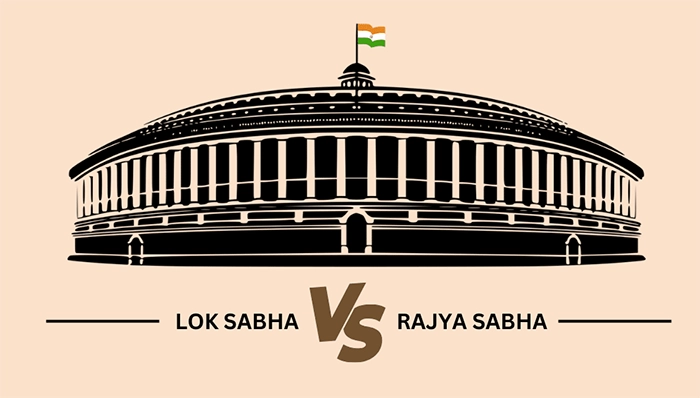
Privileges & Immunities of Parliament
- Freedom of speech to each MP which means no action shall be taken on any words or speech spoken by him during the proceedings of the house
- No action for any public speech
- Absolute immunity from any action & for anything stated within the house
- Protected from any disclosure that one makes in parliament
Freedom from arrest
- Cannot be arrested & put in prison for any civil action within a period of “40 days before & after the commencement & termination of a session of the house”
- Immunity does not extend to arrest in criminal proceedings or contempt of court or preventive detention
- Right to refuse to give evidence & appear as a witness in a case pending in court of law when parliament is in session
Inquiries within House
- Each house has the power to institute enquiries & order attendance of the witnesses. In case of disobedience, may order to bring witnesses in custody to bar of the house
Disciplinary Powers
- For offending conduct of the house may impose disciplinary action on the member
- May expel a member for ill conduct inside or outside of the house
Privacy of debate & Right to exclude others
- Proceedings & sitting in camera
- Publication of proceedings on media
- Powers to punish a member or outsider for contempt of the house
Committee of Privileges
- To look after powers, privileges & immunities of the house & its members
- Lok Sabha > 15 members as nominated by the speaker
- Rajya Sabha > 10 members as nominated by the chairman
Limitations
- Restrictions imposed by the rules of procedure of the house
- No discussion can take place in parliament wrt conduct of any judge of SC or HC in discharge of his duties except upon a motion for removal of a judge
If you’re passionate about building a successful blogging website, check out this helpful guide at Coding Tag – How to Start a Successful Blog. It offers practical steps and expert tips to kickstart your blogging journey!
For dedicated UPSC exam preparation, we highly recommend visiting www.iasmania.com. It offers well-structured resources, current affairs, and subject-wise notes tailored specifically for aspirants. Start your journey today!

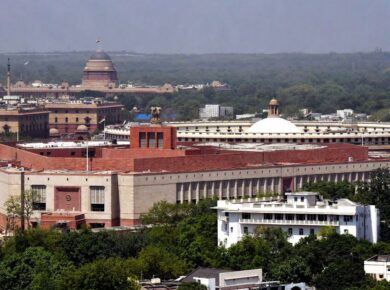
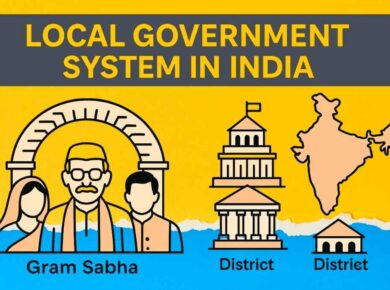


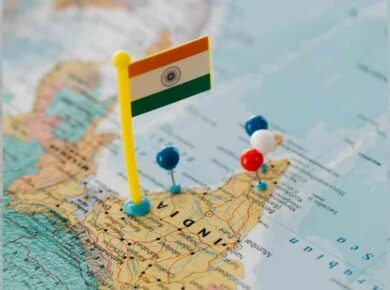
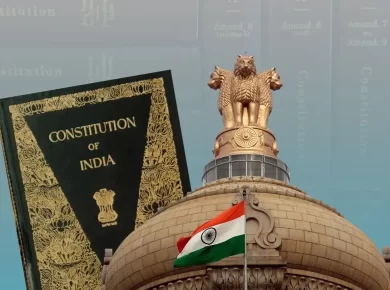
7 comments
good work.
great work.
nice notes
Nice
thank you!
very good notes
awesome notes